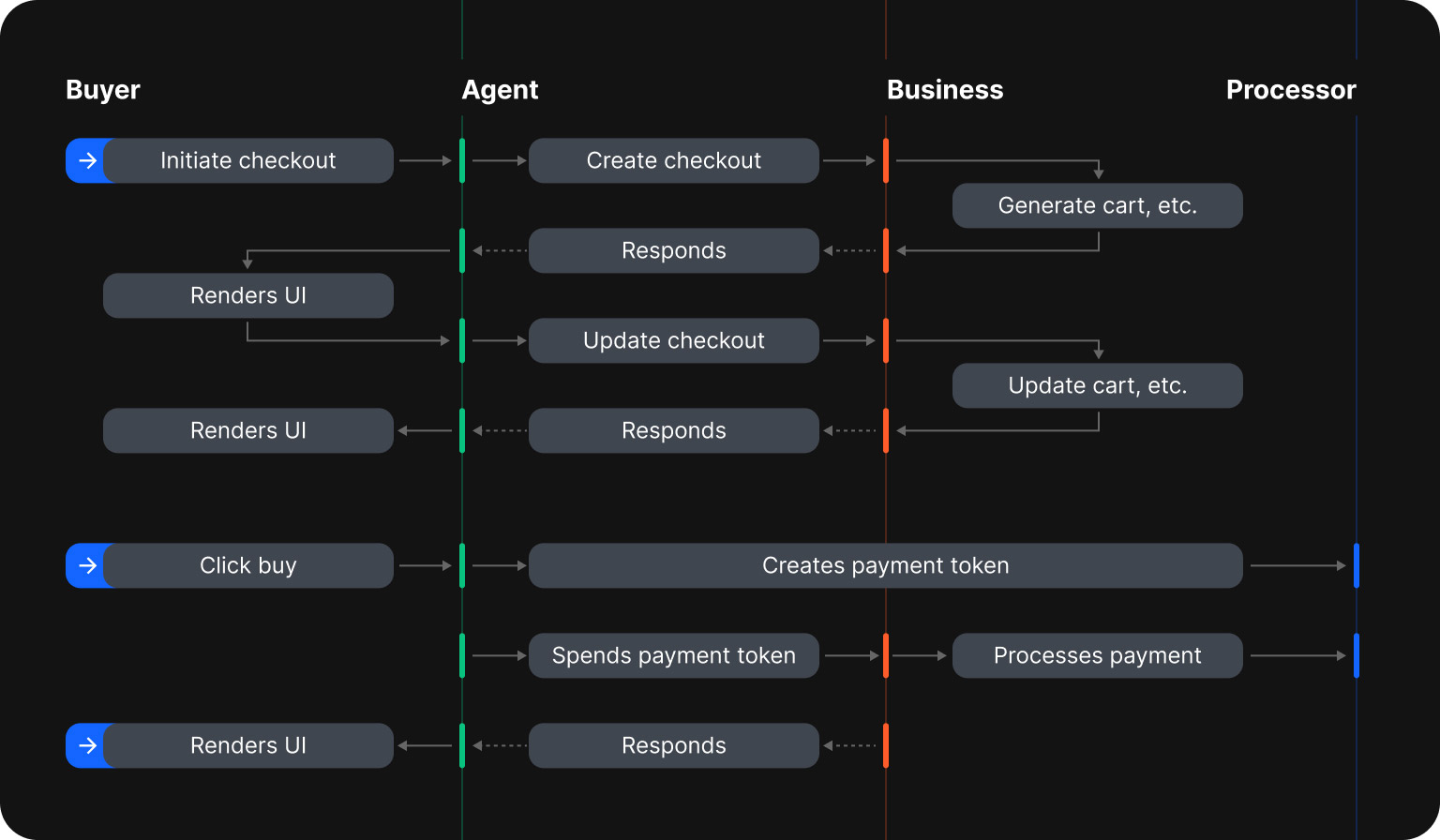In our new article, we shed light on the Agentic Commerce Protocol specifics, explain how it reinvents customer relationships, and give recommendations on its implementation.
The advent and growing use of AI and AI-powered chatbots has notably changed the game for many industries, and e-commerce is no exception. The stats say that the AI commerce market is valued at $8.65 billion in 2025, and this number is expected to reach $22.60 billion by 2032.
It’s a no-brainer, because as opposed to traditional e-commerce where businesses rely on basic website infrastructures and features, AI commerce presupposes smarter, optimized, and more tailored customer experience. A bright example of such benefit-oriented innovation is the Agentic Commerce Protocol (ACP) developed by Stripe and OpenAI.
What the Agentic Commerce Protocol Is And How It Works
The Agentic Commerce Protocol OpenAI is an open standard that enables a frictionless connection between customers, AI agents, payment providers, and merchants. Namely, by securely communicating with e-commerce platforms, AI agents like ChatGPT make a purchase in the name of users within chats, at the same time allowing businesses to maintain control over their sales, fulfillment, and customer relationships.
Here’s the Agentic Commerce Protocol’s workflow step by step to help you get into the ins and outs of this tech.
- The user acts through AI agents by specifying a high-level objective, for example, buying shoes or booking a hotel.
- Depending on the context given by the user (for example, shoes’ color and brand; how many stars / specific location the hotel should have), AI agents then leverage natural language understanding and planning to divide the key task into manageable sub-tasks. At this stage, autonomous decisions like selecting vendors, negotiating prices, or scheduling services are made.
- Once the customer selects one of the offered options, AI agents interact with external platforms and APIs such as e-commerce websites, payment providers, booking systems, etc. to process agentic transactions. This might include filling out forms with personal information and giving payment details.
- AI agents securely transmit the buyer’s payment credentials such as credit card number, expiration date, and CVV to a payment gateway through encrypted channels (like SSL/TLS). After passing secure payment tokens, the payment app validates the transaction by sending a confirmation or an error. AI agents supervise the process and handle any possible issues.
- Finally, the user gets an instant checkout and detalization of the purchase, including transaction info, payment confirmations, purchase status updates, and receipts. If needed, AI platforms can perform post-transaction activities like accounting recording, check printing, email sending, or reconciliation processing.

AI Commerce: Key Reasons Why Adopt ACP
No matter where you stand in the programmatic commerce workflow, tangible value and benefits are set in stone.
E-commerce Businesses
The Agentic Commerce Protocol is able to revamp your company through:
- Hyper-personalization is the core of the Agentic Commerce Protocol implementation. AI-fueled agentic interactions make online shopping more comfortable and entertaining through real-time product recommendations, dynamic pricing, customized promotions, and customer behavior prediction (based on preferences, previous purchases, etc.). This results in boosted customer engagement and satisfaction, as well as increased retention and loyalty.
- Superior customer support. Autonomous AI agents offer instant, 24/7 customer service, effectively mitigating issues with minimized wait times. To wit, AI agents can assist in troubleshooting payment failures, identify fraudulent purchases, notify stock availability, help with refund requests, inform of shipping status, reschedule delivering, and more.
- Higher conversion rates. AI agents effectively deal with cart abandonment problems that are so widespread in the e-commerce sphere. With intelligent, more targeted interactions, customers are guided through their purchase journey smoother, increasing average order values for your business.
- Business process automation. By leveraging AI agents, you can optimize key business processes, including inventory management, order processing, marketing campaign management, and supply chain coordination. Moreover, agentic commerce systems easily scale to deal with growing customer base. As a result, you boost operational efficiency, slash costs, and free up resources for strategic growth initiatives.

AI Agents
Underpinned by its Instant Checkout feature, the Agentic Commerce Protocol empowers autonomous AI agents with several benefits.
- Enhanced autonomy. The OpenAI protocol allows AI systems to expand their operational scope and independently manage their own economic activities, including acquiring goods / services / digital assets, investing without human oversight, making subscriptions, allocating budgets, and generating revenue streams.
- Scalability is another perk the APC gives AI agents. The protocol supports overarching scaling of your AI’s commerce activities as your needs grow, enabling more complex, large-scale autonomous operations and user interactions.
- Expanded market reach. The Agentic Commerce Protocol allows for smooth merchant integrations, sparing independent AI agents the need to build complex custom integrations for every single e-commerce platform. Product catalogs, inventory, and payments are represented in a standardized, machine-readable format, so AI agents get more discoverability and as a result more revenue.
Payment Providers
Developed by Stripe, the Agentic Commerce Protocol can also benefit if you’re a payment provider.
- Rock-solid security. The Agentic Commerce Protocol’s boast utmost security mechanisms, offering more reliability, confidentiality, and safety for your clients. These mechanisms include secure payment tokens, TLS / AES encryption, multi-factor encryption, strict access controls, Decentralization and Distributed Ledger Technology (DLT), audit trails, and PCI DSS, ISO/IEC 27001 compliance.
- Innovation enablement. By implementing the APC, you introduce cutting-edge AI-driven commerce to your business. This will differentiate you among competitors and result in attracting tech-savvy, solvent clients and enterprise users.
- Increased transaction volume and revenue. The ACP enables agentic payments in real time and in an automated manner, minimizing friction and encouraging more frequent purchases. As a result, faster and more seamless checkouts lead to higher conversions and increased transaction volume. On top of that, payment providers can generate new revenue streams through micropayments, subscriptions, and complex multi-party payments.
How to Implement the Agentic Commerce Protocol: Challenges And Considerations
The protocol implementation seems quite easy at first glance, but if we go deep, each stage of the process involves its peculiarities that might require help by a third-party savvy-tech software provider.
Preparation
- Identify key objectives, desired outcomes, and use cases (including user personas) you want to introduce to your business through the ACP.
- Get into the ins and outs of OpenAI’s ACP specifications and best practices to carefully plan future integration procedures, including resource allocation.
- Form a multidisciplinary team with deep knowledge of artificial intelligence, API integrations, and GhatGPT development. Your specialists should also possess vast security competence and be experienced in the e-commerce domain.
- Set up the infrastructure, including commerce cloud services, development environments, and security protocols.
Checkout API Building
- The Agentic Commerce Protocol offers the Instant Checkout feature in ChatGPT for a seamless set-up. You should apply to participate in Instant Checkout, sharing your product feed with ChatGPT.
- Leverage the following spec to build your Agentic Checkout API for managing the checkout lifecycle. This includes creating agent-facing endpoints that would integrate with your existing commerce infrastructure and payment processor, and would return the current state of the checkout from every response.
- Connect your APIs with OpenAI’s language models, while customizing prompts and responses for AI agents.
Payment API Integration
- You can process agentic payments with the default payment provider Stripe or implement any other trusted payment service that is compliant with the Delegated Payment Spec. Stripe’s Shared Payment Token is the first Delegated Payment Spec-compatible implementation with more providers coming soon.
- Create smooth payment workflows within your API, including functionality like authorization, transaction processing, and refunds. Also, pay attention to building intuitive interfaces for enhanced user experiences.
- Rigorously test your APIs for accuracy, reliability, and security. Make sure they fully comply with the Agentic Commerce Protocol guidelines.
- To be able to securely process payment credentials, ensure strict adherence to PCI DSS standards. Implement robust encryption, advanced fraud detection, and user authentication mechanisms.
Validation And Certification
- Before moving to production, make sure your AI system meets the OpenAI’s and Stripe’s ACP standards. Perform thorough reviews and testing across API specification (product feed validation, data integrity, etc.), security (authorization testing, signature verification), user experience (task completion, error handling), and performance (load and stress testing, continuous evaluation, interoperability testing).
- Besides technical aspects, revise your operation capabilities. This certification part comprises audits around inventory management, order processing, logistics integration, customer support workflows, as well as monitoring and analytics.
- Create detailed documentation of the protocol’s implementation, including architecture diagrams, security measures, and compliance checks. Rapidly address feedback from the certification process, fix any issues, iterate and improve to finally resubmit if necessary.
The Agentic Commerce Protocol: Kick-Start with Aetsoft
With the Agentic Commerce Protocol by OpenAI and Stripe, ushering in a new era of AI commerce is made easy for merchants, independent AI agents, and payment providers. Improved operational efficiency, workflow automation, enhanced customer service, higher conversions, increased security, scalability, market expansion — benefits from the protocol implementation are limitless.
Although the Agentic Commerce Protocol is an open-source tool designed to be as straightforward as possible, you might need third-party tech help, especially if you deal with legacy systems within your business and don’t have a strong internal engineering team.
An adept expert in all things AI, Aetsoft can assist you with implementation. From data optimization to API development to overhauling your entire e-commerce backend, we’ve got your back. Connect with us now to discuss your specific business needs.





